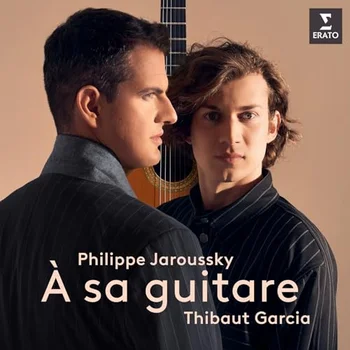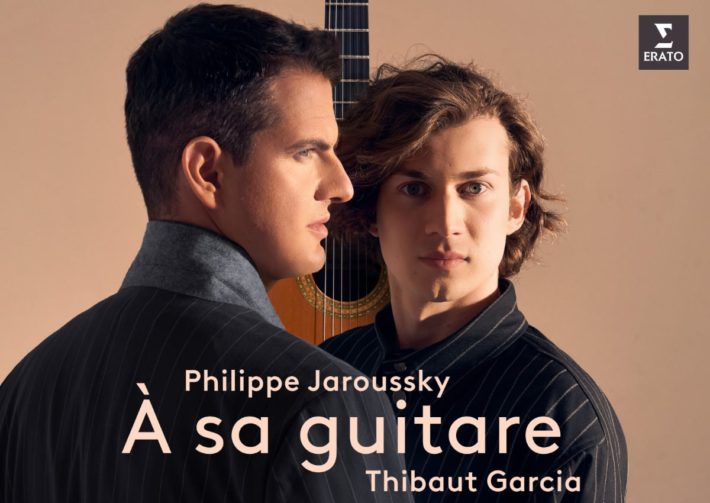In Philippe Jaroussky’s own words, À sa guitare, his collaboration with guitarist Thibaut Garcia, will “no doubt chock a few purists.” The track listing is diverse, spanning almost 500 years: we find some John Dowland, a rare lied by Mozart, Schubert’s famed Erlkonig, and even a selection by ’60s chanteuse, Barbara. This album marks what Jaroussky says is a move away from the operatic genre toward a more acoustic one. Given his 2020 effort (reviewed here) that centered on the Italian oratorio, I was naturally curious to see how he would fare in this distinctly different light.

The eponymous À sa guitare which opens the album makes it immediately clear that Jaroussky and Garcia are comfortable and skilled collaborators, unafraid to give and take to establish a fluid synchronicity. The balance between their parts comes through best in the intervallic passages, but throughout, their phrases are also seamlessly aligned. And in the guitar solos, Thibaut shines, introducing our ears to plenty of colors.
There are no shortages of fine performances of Giordani’s Caro Mio Ben, from Hvorostovsky’s regal take on Marriner’s arrangement to Bartoli’s striking pairing with Györgi Fischer (both on Decca). For all the competition, though, the duo offers something new: a pristine simplicity, with the guitarist’s rich tones gently tempering the countertenor’s brightness. Jaroussky, too, shows a lot of vocal control in how he delivers an expressive arc to each line. The arrangement itself (by David Jacques) is also nicely done: it creates a more intimate space in which voice and guitar can interact with extreme clarity.
I wasn’t exactly sure what to expect from the transcription of Erlkönig (track 5), especially when the piano plays such a crucial role in the original. The absence of the signature octaves is admittedly less rousing, but the guitar accompaniment has its strengths. The density of the piano part can unwittingly encourage competition, and a less experienced singer might overcompensate with a contrived sense of drama. The guitar’s naturally lighter sound finds its place perfectly, creating the requisite momentum while allowing the voice to soar. A large amount of the credit of course goes to Garcia’s masterful articulation: one can hear, for instance, two clearly delineated lines in the instrumental introduction. Meanwhile, Jaroussky’s singing is effortless yet exciting: his higher register has a piercing quality which delivers the requisite urgency. He also uses his wide range to recreate the dialogue at the heart of the song.
We’re treated to a guitar interlude in the form of Poulenc’s Sarabande (track 7). This was the sole guitar work the composer ever wrote, but it is a real gem. Thibaut describes the work as a whisper; while that may be true, he still uncovers multiple dimensions, including various shades of soft dynamics and attention to the contrapuntal textures.
Barbara’s Septembre (track 8), Thibaut’s transcription, is a clever choice that offers a balance to the harrowing Schubert. The guitar opening has distant harmonic echoes to Satie’s Gymnopedies No. 1 but soon gives way to a swaying waltz pattern with some improvisatory filigrees. The voice comparison is quite interesting here: Barbara’s husky alto lends a calm reminiscence to the original, where Jaroussky’s falsetto (with some beautiful color changes) creates a more poignant account – a very suitable interpretation for a song about goodbyes.
The concluding track from Britten’s arrangement of folk songs (Vol 2: France) is perhaps a nod to the performers’ heritage. A tender sadness comes through exquisitely in Jaroussky’s singing: the final moments especially show his finesse and might well be the most moving part of the song.
The liner notes feature a joint interview with the performers. With a set so eclectic, this format is a sensible way around a run-of-the mill listing and description. I found the personal commentary about the chosen selections honest and refreshing, especially given the insights and perspectives from two different types of instrumentalists. The sound engineers do some solid work to highlight the collaboration between Jaroussky and Garcia, while still allowing their individual personalities and nuances their due presence.
The stellar performances go hand-in-hand with the well-conceived transcriptions. À sa guitare is an illuminating album worth exploring for purists and adventurers alike.
Recommended Comparisons
Hvorostovsky | Bartoli | Mehta | Costanzo
À sa guitare
Philippe Jaroussky – Countertenor
Thibaut Garcia – Guitar
Erato, CD 9029500570



















